opens in a new window
SF titan Kim Stanley Robinson’s breakout novel, now in a Tor Essentials edition with a new introduction by Henry Farrell
Tor Essentials presents new editions of science fiction and fantasy titles of proven merit and lasting value, each volume introduced by an appropriate literary figure.
Decades before his massively successful The Ministry for the Future (2020), Kim Stanley Robinson wrote one of SF’s greatest meditations on extended human lifespan, the limitations of human memory, and the haunted confabulations that go with forgetting.
On the North Pole of Pluto there stands an enigma: a huge circle of standing blocks of ice, built on the pattern of Earth’s Stonehenge—but ten times the size, standing alone at the edge of the Solar System. What is it? Who could have built it?
The secret lies in the chaotic decades of the Martian Revolution, in the lost memories of those who have lived for centuries.
Please enjoy this free excerpt of opens in a new windowIcehenge by Kim Stanley Robinson, on sale 6/11/24
EMMA WEIL
2248 AD
The first indication I had of the mutiny came as we approached the inner limit of the first asteroid belt. Of course I didn’t know what it meant at the time; it was no more than a locked door.
The first belt we call the dud belt, because the asteroids in it are basaltic achondrite, and no use to miners. But we would be among the carbonaceous chondrites soon enough, and one day I went down to the farm to get ready. I fed a bit more light to the algae, for in the following weeks when the boats went out to break up rocks there would be a significant oxygen depletion, and we would need more chlorella around to help balance the gas exchange. I activated a few more bulbs in the lamps and started fooling around with the suspension medium. Biologic life-support systems are my work and play (I am one of the best at it), and since I was making room for more chlorella, I once again became interested in the excess biomass problem. Thinking to cut down on surplus algae by suspending it less densely, I walked between long rows of spinach and cabbage to the door of one of the storage rooms at the back of the farm, to get a few more tanks. I turned the handle of the door. It was locked.
“Emma!” called a voice. I looked up. It was Al Nordhoff, one of my assistants.
“Do you know why this door is locked?” I asked.
He shook his head. “I was wondering myself yesterday. I guess there’s classified cargo in there. I was told to leave it alone.”
“It’s our storage room,” I said, irritated.
Al shrugged. “Ask Captain Swann about it.”
“I will.”
Now Eric Swann and I were old friends, and I was upset that something was going on in my area that he had failed to tell me about. So when I found him on the bridge, I came straight to the point.
“Eric, how come I’m locked out of one of my own storage rooms? What have you got in there?”
Immediately he blushed as red as his hair, and hung his head. The two rocketry and guidance officers on the bridge looked down at their consoles.
“I can’t tell you what’s in there, Emma. It’s classified. I can’t tell anyone until later.”
I stared at him. I know I can intimidate people if I look at them hard enough. His blush got deeper, his freckles disappeared in the general redness, his blue eyes gave me a watery stare. But he wasn’t going to tell me. I curled my lip at him and left the bridge.
That was the first sign: a locked door, a secret reason for it. I thought to myself, We’re taking something for the Committee out to Ceres, perhaps. Weapons, no doubt. It was typical of the Mars Development Committee to keep secrets. But I didn’t jump to any conclusions; merely stayed alert.
The second sign was one I probably would have missed, had I not been alerted by the first. I was walking down the corridor to the dining commons, past the tapestry lounges between the commons and the bedrooms, when I heard voices from a lounge and stopped. Just the voices sounded funny, all whispery and rapid. I recognized John Dancer’s voice:
“We can’t do anything of the sort until after the rendezvous, and you know it.”
“No one will notice,” said a woman, perhaps Ilene Breton.
“You hope no one would notice,” Dancer replied. “But you can’t be sure that Duggins or Nordhoff wouldn’t stumble across it. We have to wait on everything until after the rendezvous, you know that.”
Then I heard steps across the velcro carpet behind me, and with a start I began to walk again, past the door of the lounge. I looked in; John and Ilene, sure enough, among several others. They all looked up as I appeared in the doorway, and their conversation abruptly died. I stared at them and they stared back, at a loss for speech. I walked on to the dining commons.
A rendezvous in the belt. A group of people, not the superior officers of the ship, in on this event and keeping it a secret from the others. A locked storage hold Things were not falling together for me.
After that I began to see things everywhere. People stopped talking when I walked by. There were meetings late at night, in bedrooms. I walked by the radio room once, and someone was sending out a long message through the coding machine. Quite a few of the storage room doors were locked, back behind the farm; and some of the ore holds were locked as well.
After a few days of this I shook my head and wondered if I were making it all up. There were explanations for everything I had noticed. Shipboard life tends to become cliquish on the best of runs; even though there were only forty of us, divisions would spring up over the year of an expedition. And these were troubled times, back on Mars. The consolidation of the various sectors under the central coordination of the Committee was causing a lot of dissatisfaction. Sectionalism was rife, subversive groups were everywhere, supposedly. These facts were enough to explain all the little factions I now noticed on the Rust Eagle. And paranoia is one of the most common shipboard disorders seeing patterns is easy in such a heavily patterned environment.
So I began to discount it all. Perhaps we were carrying something to Ceres for the Committee, but that was nothing.
Still, there was something about the atmosphere of the ship in those days. More people than usual were jumpy and strained. There were mysterious glances exchanged in an atmosphere of mystery.
But here hindsight may be influencing me. The facts are what I want here. This record will help me to remember these events many years, perhaps centuries, from now, and so I must set down the facts, the sharpest spur to the memory.
In any case, the third sign was unmistakable. By this time the sun was nearly between us and Mars, and I went to the radio room to get a last letter off to my fool of a father, in jail temporarily for his loud mouth. Afterwards, I went to the jump tube, and was about to fall down to the living quarters when I heard voices floating down the tube from the bridge. Had that been my name? I pulled myself up the rail to the steps that led to the bridge, and stayed there, eavesdropping again. A habit of mine. Once more, John Dancer was speaking.
“Emma Weil is pro-Committee all the way,” he said as if arguing the point.
“Even so,” said another man, and a couple of voices cut over so that I didn’t hear what he said.
“No,” Dancer said, interrupting the other voices quickly. “Weil is probably the most important person aboard this ship. We can’t talk to her about any of this until Swann says so, and that won’t be until after the rendezvous. So you can forget it.”
That did it. When it was clear the conversation was over I hopped back to the jump tube and fell down it, aiding the faint acceleration-gravity with some pulls on the rail. I ticked off in my mind the places Swann would most likely be at that hour, intent on finding him and having a long talk. It is not healthy to believe yourself the focus of a ship-wide conspiracy.
━━ ˖°˖ ☾☆☽ ˖°˖ ━━━━━━━
I had known Eric Swann for a long time.
Before the turn of the century, every sector ran its own mining expeditions. Royal Dutch looked for carbonaceous chondrite; Mobil was after the basaltic chondrites in the dud belt; Texas mined the silicate types. Chevron had the project of pulling one of the Amors into a Martian orbit, to make another moon. (This became the moon Amor, which was turned into a detention center. My father lived there.) So each sector had its own asteroid crew, and I got to know the Royal Dutch miners pretty well. Swann was one of the rocketry and guidance officers, and a good friend of my husband Charlie, who was also in R and G. Over the course of many runs in the belt I talked with Swann often, and even after Charlie and I divorced we remained close. But when the Committee took over the mining operations in 2213, all the teams, even the Soviets, were thrown into a common pool, and I saw all of my friends from Royal Dutch a lot less often. My infrequent assignments with Swann had been cause for celebration, and this present assignment, with him as captain, I had thought would be a real pleasure.
Now, pulling around the ship I was the most important person on, I was not so sure. But I thought, Swann will tell me what’s going on. And if he doesn’t know anything about all this, then he’d better be told that something funny is happening.
I found him in one of the little window rooms, seated before the thick plasteel separating him from the vacuum. His long legs were crossed in the yoga position, and he hummed softly: meditating, his mind a floating mirror of the changing square of stars.
“Hey Eric,” I said, none too softly.
“Emma,” he said dreamily, and stretched his arms like a cat. “Sit down.” He showed me a chunk of rock he had had in his lap. “Look at this Chantonnay.” That’s a chondrite that has been shocked into harder rock. “Pretty, isn’t it?”
I sat. “Yes,” I said. “So what’s happening on this trip?”
He blushed. Swann was faster at that than anyone I ever saw. “Not much. Beyond that I can’t say.”
“I know that’s the official position. But you can tell me here.”
He shook his head. “I’m going to tell you, but it has to wait a while longer.” He looked at me directly. “Don’t get angry, Emma.”
“But other people know what’s going on! A lot of them. And they’re talking about me.” I told him about the things I had noticed and overheard. “Now why should I be the most important person on this ship? That’s absurd! And why should they know about whatever it is we’re doing, and not me?”
Swann looked worried, annoyed. “They don’t all know You see, your help will be important, essential perhaps—” He stopped, as if he had already said too much. His freckled face twisted as his mouth moved about. Finally he shook his head violently. “You’ll just have to wait a few more days, Emma. Trust me, all right? Just trust me and wait.”
That was hardly satisfactory, but what could I do? He knew something, but he wasn’t going to tell it to me. Tight-lipped, I nodded my good-bye and left.
━━ ˖°˖ ☾☆☽ ˖°˖ ━━━━━━━
The mutiny occurred, ironically enough, on my eightieth birthday, a few days after my talk with Swann. August 5, 2248.
I woke up thinking, now you are an octogenarian. I got out of bed (deceleration-gee entirely gone, weightless now as we coasted), sponged my face, looked in the mirror. It is a strange experience to look inside your own retinas; down there inside is the one thinking, in that other face . . . it seems as if, if you could get the light right, you could see yourself.
I grasped the handholds of my exerciser and worked out for a while, thinking about birthdays. All the birthdays in this new age. One of my earliest memories, now, was my tenth birthday. My mother took me to the medical station, where I had to drink foul-tasting stuff and submit to tests and some shots—just quick blasts of air on the skin, but they scared me. “You’ll appreciate this later,” my mom said, with a funny expression. “You won’t get sick and weak when you’re old. Your immune system will stay strong. You’ll live for ever so long, Emma, don’t cry.”
Yes, yes. Apparently she was right, I thought, looking into the mirror again, where my image seemed to pulse with color under the artificial lights. Very long lives, young at eighty: the triumph of gerontology. As always, I wondered what I would do with all the extra years—the extra lives. Would I live to stand free on Martian soil, and breathe Martian air?
Thinking these thoughts I left my room, intent on breakfast. The lounges down the hall from the bedrooms were empty, an unusual thing. I walked into the last lounge before the corridor turned, to look out the small window in it, with its view over the bridge.
And there they were: two silver rectangles, like asteroids crushed into ingots of the metals they contained. Spaceships!
They were asteroid miners of the PR class, sister ships of our own. I stared at them motionlessly, my heart thudding like a drum, thinking rendezvous. The ships grew to the size of decks of cards, very slowly. They were the shape of a card deck as well, with the mining cranes and drills folded together at their fronts, bridge ceilings just barely bulging from their sides (tiny crescents of light), rocket exhausts large at their rear, like beads on their sides and front. Brilliant points of light shone from the windows, like the fluorescent spots on the deep-sea fish of Earth. They looked small beside an irregular blue-gray asteroid, against the dead black of space.
I left the lounge slowly. Turned and walked down the corridor—
In the dining commons it was bedlam.
I stopped and stared. Of the entire crew of forty-three, at least twenty-five must have been in the commons, shouting and laughing, six or seven singing the Ode to Joy, others setting up the drinks table (Ilene maneuvering the mass of the big coffee pot), John and Steven and Lanya in a mass hugging and laughing-sobbing, tears in their eyes. And on the video screen was a straight-on camera shot of the two ships, silver dots against a blue-gray asteroid, so that it looked like a die thrown through the vacuum.
They all had known. Every single one of them in the room. I found myself blinking rapidly, embarrassed and angry. Why hadn’t I been told? I wiped my eyes and got out of the doorway before I was noticed by someone inside.
Andrew Duggins flew by, pulling himself along the hall rails. His big face was scowling. “Emma!” he said, “come on,” and pulled away. I only looked at him, and he stopped. “This is a mutiny!” he said, jerking his head in the direction of the commons. “They’re taking over the ship, and those others out there too. We’ve got to try and get a message off to Ceres—to defend ourselves!” With a hard yank he pulled himself away, in the direction of the radio room.
Mutiny. All of the mysterious events I had noticed fell together, into a pattern. A plan to take over the ship. Had Swann been too afraid of the possibility to discuss it?
But there was no time for a detailed analysis. I leaped off the floor, and with a strong pull on the rail was after Duggins.
Outside the radio room there was a full-fledged fight going on. I saw Al Nordhoff striking one of the ship police in the face, Amy Van Danke twisting furiously in the hold of two men, trying to bite one in the throat. Others struggled in the doorway. Shouts and Amy’s shrieks filled the air. The fight had that awkward, dangerous quality that all brawls in weightlessness exhibit. A blow that connected (one of Al’s vicious kicks to the head of a policeman, for instance) sent both parties spinning across the room. . .
“Mutiny!” Duggins bellowed, and diving forward crashed into the group in the doorway. His momentum bowled several people into the radio room, and an opening was cleared. I shoved off from the wall and grazed my head on the doorjamb going in.
After that things were blurry, but I was angry—angry that I had been deceived, that Swann and the general order of things were being challenged, that friends of mine were being hit—and I swung blindly. I caught one of the policemen on the nose with my fist, and his head smacked the wall with a loud thump. The room was crowded, arms and legs were swinging. The radio console itself was crawling with bodies. Duggins was bellowing still, and hauling figures away from the mass on the radio controls. Someone got me in a choke hold from behind. I put heel to groin and discovered it was a woman—put elbow in diaphragm and twisted under her arm, nearly strangled. Duggins had cleared the radio and was desperately manipulating the dials. I put a haymaker on the ear of a man trying to pull him away. Screams and spherical droplets of blood filled the air—
Reinforcements arrived. Eric Swann slipped through the doorway, his red hair flying wild, a tranquilizer gun in his hand. Others followed him. Darts whizzed through the air, sounding like arrows. “Mutiny!” I shrieked. “Eric! Mutiny! Mutiny!”
He saw me, pointed his gun at me and shot. I looked at the dart hanging from my forearm.
. . . The next thing I knew, I was being guided down the jump tube. Leaving it at my floor. I saw Swann’s face swimming above me. “Mutiny,” I said.
“That’s true,” Eric replied. “We’re going to have to put you under arrest for a few hours.” His freckle-face was stretched into a fool’s grin.
“Asshole,” I muttered. I wanted to run. I could outrun all of them. “I thought you were m’friend.”
“I am your friend, Emma. It was just too dangerous to explain. Davydov will tell you all about it when you see him.”
Davydov. Davydov? “But he was lost,” I muttered, fighting sleep and very confused. “He’s dead.”
Then I was in my bed, strapped securely. “Get some sleep,” Swann said. “I’ll be back in a few hours.” I gave him a look planned to turn him to stone, but he just grinned and I fell asleep in the middle of it, thinking, Mutiny. . . .
━━ ˖°˖ ☾☆☽ ˖°˖ ━━━━━━━
When I woke up again, Swann was by my bed, tilted in the no-gee so that his head hung over me. “How are you feeling?” he asked.
“Bad.” I waved him away and he pushed off into the air above the bed. I rubbed my eyes. “What happened, Swann?”
“A mutiny, you’ve been calling it.” He smiled.
“And it’s true?”
He nodded.
“But why? Who are you?”
“Did you ever hear of the Mars Starship Association?”
I thought. “A long time ago? One of those secret anti-Committee groups.”
“We weren’t anti-Committee,” he said. “We were just a club. An advocacy group. We wanted the Committee to support research for an interstellar expedition.”
“So?”
“So the Committee didn’t want to do it. And they took us to be part of the anti-Committee movement, so they outlawed us. Jailed the leaders, transferred the members to different sectors. They made us anti-Committee.”
“Didn’t all that happen a long time ago?” I asked, still disoriented. “What has that got to do with this?”
“We regrouped,” he said. “Secretly. We’ve existed underground for all these years. This is our coming out, you might say.”
“But why? What good does it do you to take over a few asteroid miners? You aren’t planning to use them as starships, are you?” I laughed shortly at the idea.
He stared at me without answering, and suddenly I knew that I had guessed it.
I sat up carefully, feeling cold and a touch dizzy. “You must be joking.”
“Not at all. We’re going to join the Lermontov and the Hidalgo, and complete their life-support systems’ closure.”
“Impossible,” I breathed, still stunned at the very idea.
“Not impossible,” he said patiently. “That’s what the MSA has been working on these last forty years—”
“One of those ships is Hidalgo?” I interrupted. My processing was still impaired by the drugs he had shot me with.
“That’s right.”
“So Davydov is alive….. ”
“He certainly is. You knew him, didn’t you?”
“Yes.” Davydov had been the captain of Hidalgo when it disappeared in the Achilles group three years before. I had thought him dead. . . .
“There’s no way I’ll go,” I said after a pause. “You can’t kidnap me and drag me along on some insane interstellar attempt—”
“No! No. We’re sending Rust Eagle back with all the non-MSA people from the three ships.”
I let out a long sigh of relief. Yet sudden anguish filled me at the thought of the mess I was suddenly in, of the fanatics who now had control of my life, and I cried out, “Eric, you knew this was going to happen out here. Why didn’t you arrange to keep me off this flight?”
He looked away from me, pushed himself down to the floor. Red-faced, he said, “I did the opposite, Emma.”
“You what?”
“There are MSA people in the expedition scheduling office, and”— still staring at the floor—“I told them to arrange for you to be aboard Rust Eagle this time.”
“But, Swann!” I said, struggling for words. “Why? Why did you do that to me?”
“Well—because, Emma, you’re one of the best life-support systems designers there is on Mars, or anywhere. Everyone knows that, you know that. And even though our systems designers have got a lot of improvements for the starship, they still have to be installed in those two ships, and made to work. And we have to do it before the Committee police find us. Your help could make the difference, Emma.”
“Oh, Swann.”
“It could! Look, I knew it was imposing on you, but I thought, if we got you out here ignorant of our plans, then you couldn’t be held responsible. When you return to Mars you can tell them you didn’t know anything about the MSA, that we made you help us. That was why I didn’t tell you anything on the way out here, don’t you see? And I know you aren’t that strong a supporter of the Committee, are you? They’re just a bunch of thugs. So that if your old friends asked you for help that only you can give, and you couldn’t be held culpable, you might help? Even if it was illegal?” He looked up at me, his blue eyes grave.
“You’re asking for the impossible,” I told him. “Your MSA has lost touch with reality. You’re talking about travel across light-years, for God’s sake, and you’ve got five-year systems to do it with!”
“They can be modified,” Swann insisted. “Davydov will explain the whole project when you see him. He wants to talk with you as soon as you’d like to.”
“Davydov,” I said darkly. “He’s the one behind this madness.”
“We’re all behind it, Emma. And it isn’t mad.”
I waved an arm and held my head in my hands, as it was pulsing with all the bad news. “Just leave me alone for a while.”
“Sure,” he said. “I know it’s a lot to take in. Just tell me when you want to see Davydov. He’s over on Hidalgo.”
“I’ll tell you,” I said, and looked at the wall until he left the room.
━━ ˖°˖ ☾☆☽ ˖°˖ ━━━━━━━
I had better tell about Oleg Davydov here, for we were lovers once, and for me the memory of him was marked with pain and anger, and a sense of loss—loss that no matter how long I lived could not be recouped or forgotten.
I was just out of the University of Mars, working at the Hellas Basin, in the new settlement near the western edge of the Basin where underground reservoirs and aquifers had been discovered. It was a good supply of water, but the situation was delicate, and the use of the water caused ecologic problems. I was set to work with others to solve these problems, and I quickly proved that I was the best among the systems people there. I had a grasp of the whole Hellas set-up that seemed perfectly natural to me, but was (I could see) impressive to others. And I was a good middle-distance runner—so that all in all, I was a confident youth, perhaps even a bit arrogant.
During my second year there I met Oleg Davydov. He was staying in Burroughs, the big government center to the north, doing some work for the Soviet mining cartel. We met in a restaurant, introduced by a mutual acquaintance.
He was tall and bulky, a handsome man. One of the Soviet blacks, they call them. I guess some of their ancestors came from one of the USSR’s client countries in Africa. The color had been pretty well watered down over the generations, and Davydov had coffee-and-cream-colored skin. His hair was black and wooly; he had thick lips under a thin, aquiline nose; a heavy beard, shaved so that his lower face was rough; and his eyes were ice blue. They seemed to jump out of his face. So he was a pretty good racial mix. But on Mars, where ninety-nine percent of the population is fish-belly white, as they say, any touch of skin color is highly valued. It made one look so . . . healthy, and vital. This Davydov was really extremely good-looking, a color delight to the eye. I watched him then, as we sat on adjacent stools in that Burroughs restaurant, talking, drinking, flirting a little . . . watched so closely that I can recall the potted palm and white wall that were behind him, although I don’t remember a word we said. It was one of those charmed nights, when both parties are aware of the mutual attraction.
We spent that night together, and the next several nights as well. We visited the first colony in the area, The Can, and marvelled at the exhibits in the museum there. We scrambled around the base of the Fluted Cliffs in Hellespontus Montes, and spent a night out in a survival tent. I beat him easily in a footrace, and then won a 1500-meter race for him at a Burroughs track. Every hour available to us we spent together, and I fell in love. Oleg was young, witty, proud of his many abilities; he was exotically bilingual (a Russian!), affectionate, sensual. We spent a lot of time in bed. I remember that in the dark I could see little more than his teeth when he grinned, and his eyes, which seemed light grey. I loved making love with him . . . I remember late dinners together, in Burroughs or out at the station. And innumerable train rides, together or alone, across the sere rust deserts between Burroughs and Hellas—sitting by the window looking out at the curved red horizon, feeling happy and excited. Well, those are the kind of times that you only live through once. I remember them well.
The arguments began quite soon after those first weeks. We were an arrogant pair and didn’t know any better. For a long time I didn’t even realize that our disagreements were particularly serious, for I couldn’t imagine anyone arguing with me for very long. (Yes, I was that self-important.) But Oleg Davydov did. I can’t remember much of what we argued about—that period of time, unlike the beginning, is a convenient blur in my memory. One time I do remember (of course the rest could be called up as well): I had come into Burroughs on the late train, and we were out eating in a Greek restaurant behind the train station. I was tired, and nervous about our relationship, and sick of Hellas. Hoping to compliment him, I made some comment about how much more fun it would be to be an asteroid miner like he was.
“We aren’t doing anything out there,” he said in response. “Just making money for the corporations—making a few people on Earth rich, while everything else down there falls apart.”
“Well, at least you’re out there exploring,” I said.
He looked annoyed, an expression I was becoming familiar with. “But we aren’t, that’s what I’m saying. With our capabilities we could be exploring the whole solar system. We could have stations on the Jovian moons, around Saturn, all the way out to Pluto. We need a solar watch station on Pluto.”
“I wasn’t aware of that fact,” I said sarcastically.
His pale blue eyes pierced me. “Of course you weren’t. You think it’s perfectly all right to continue making money from those stupid asteroids, and nothing more, here at the end of the twenty-second century.”
Copyright © 1998 from Kim Stanley Robinson
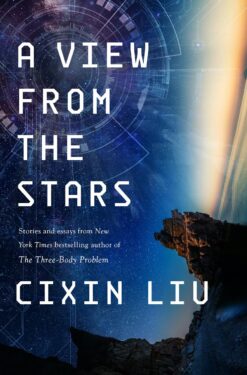 opens in a new windowA View from the Stars by Cixin Liu
opens in a new windowA View from the Stars by Cixin Liu opens in a new windowLyorn by Steven Brust
opens in a new windowLyorn by Steven Brust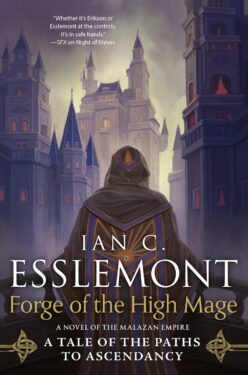 opens in a new windowForge of the High Mage by Ian C. Esslemont
opens in a new windowForge of the High Mage by Ian C. Esslemont opens in a new windowNecrobane by Daniel M. Ford
opens in a new windowNecrobane by Daniel M. Ford opens in a new windowWeb of Angels by John M. Ford
opens in a new windowWeb of Angels by John M. Ford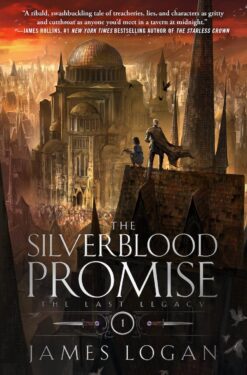 opens in a new windowThe Silverblood Promise by James Logan
opens in a new windowThe Silverblood Promise by James Logan opens in a new windowWhen Among Crows by Veronica Roth
opens in a new windowWhen Among Crows by Veronica Roth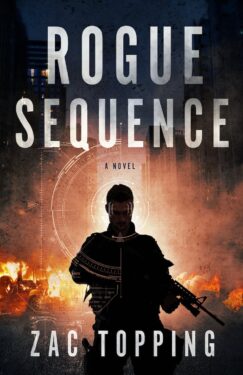 opens in a new windowRogue Sequence by Zac Topping
opens in a new windowRogue Sequence by Zac Topping opens in a new windowIcehenge by Kim Stanley Robinson
opens in a new windowIcehenge by Kim Stanley Robinson opens in a new windowCraft: Stories I Wrote for the Devil by Ananda Lima
opens in a new windowCraft: Stories I Wrote for the Devil by Ananda Lima opens in a new windowThe Daughter’s War by Christopher Buehlman
opens in a new windowThe Daughter’s War by Christopher Buehlman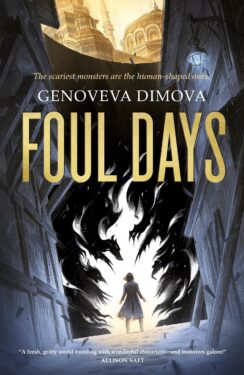 opens in a new windowFoul Days by Genoveva Dimova
opens in a new windowFoul Days by Genoveva Dimova






